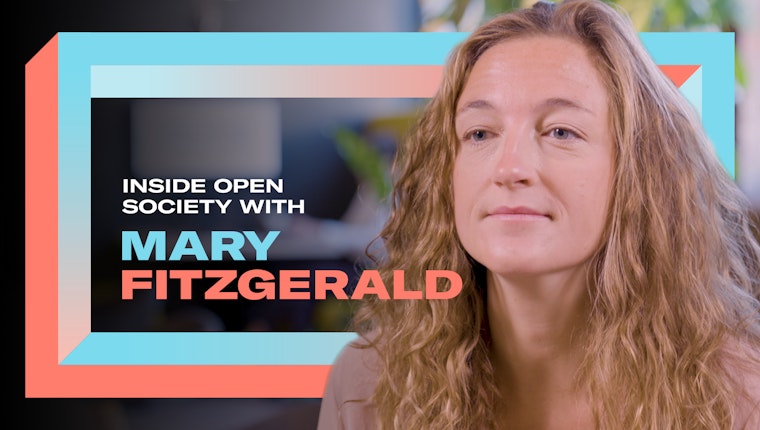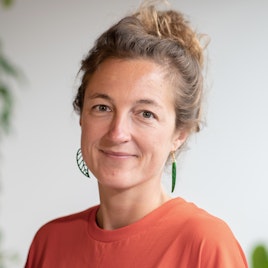How Expression Inspires Change
By Mary Fitzgerald

Inside Open Society is a look at the leaders at the Open Society Foundations who are advancing our vision to address the world’s most urgent threats to democracy and human rights at a transformative scale.
As a former journalist, nothing is closer to my heart than supporting fearless, independent media. When I was editor in chief at openDemocracy, a scrappy global news outlet, our reporting helped change laws, prompted action from tech giants, and lifted voices from parts of the world that have been silenced under repressive regimes.
But change doesn’t come only from exposing the “bad guys.” Challenging power isn’t enough: We also need to inspire change. That’s why supporting socially engaged art is so important, too: Artists and cultural producers push us to think differently about the world we live in and what's possible. And this work is more critical than ever.
Across the world, a record number of journalists are being killed, jailed, threatened, harassed, and spied upon. They’re being sued for accurate reporting that exposes things the rich and powerful don’t want us to know. From India to the Philippines to the UK, there’s been a sharp rise in coordinated, misogynist attacks against female journalists. The picture is similarly grim when you look at the intimidation, marginalization and censorship of artists, filmmakers, and those working at the cutting edge of culture and activism. Even in so-called democracies, we are seeing state-sponsored attacks on journalists and artists who ask the uncomfortable questions, or challenge the status quo.
Open societies are places where you have the space to think freely, to express yourself freely, to talk to people, to organize, to protest, to come together, to debate, to deliberate.
Disinformation and misinformation—moving at lightning speed and designed to trigger deeply held fears and suspicions—is warping public discourse, empowering authoritarians, polarizing societies, and exacerbating injustice and discrimination. It can, for example, encourage people not to vaccinate their children. It can encourage mobs to rise up against democracy in the United States or Brazil. It can fuel and incite ethnic hatred and violence from Myanmar to Ethiopia. And social media platforms are making enormous profits from this.
That’s why the work of our team—Expression—is so important. We support journalists to engage communities and audiences, to expose and explore issues that matter most to them. We support visionary artists and cultural producers to challenge and reframe the world we live in. And we support talented lawyers, activists, and advocates to take the fight to big tech and to push for more democratic, egalitarian, and safer spaces online.
This work has real world implications. The European Union, for example, recently passed groundbreaking new laws to rein in the power of big tech after relentless work from our grantees. Our partners are also fighting the use of targeted surveillance spyware to track, monitor, and silence journalists and human rights defenders. Our grantees, Citizen Lab, Amnesty, Access Now, and R3D exposed how the Pegasus software was being used to spy on journalists and activists all over the world.
We’ve been proud to support art and cultural freedom for many years. While Confederate statues across the American South are being torn down, Open Society has supported artists to reimagine what those public spaces look like, to reclaim the space taken by white supremacists, and to build new art—like Simone Leigh’s Mami Wata statue, which was displayed in the city of New Orleans where Robert E. Lee once stood.
In the California desert, Indigenous artist Nicholas Galanin transformed the iconic Hollywood sign into a new icon for land reparations. “Indian Land” is a rebuke of the racist history and colonization of Indigenous land and an area where only whites were allowed to buy homes. It’s a call to action and a reminder that land acknowledgments must be actively supported by the Land Back movement, less they become performative.
Open societies are places where you have the space to think freely, to express yourself freely, to talk to people, to organize, to protest, to come together, to debate, to deliberate. And that’s why the work we’re doing for journalism and for art and for tech justice is so important.

Mary Fitzgerald is director of Expression at the Open Society Foundations.

